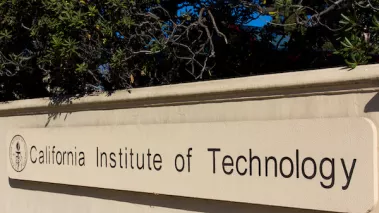Table of Contents
Caltech silent on FIRE request to review event funding guidelines that contradict school’s free speech policy, violate state law

Ken Wolter / Shutterstock.com
Last year, FIRE contacted the California Institute of Technology with concerns that new event funding guidelines issued by the university’s Graduate Student Council risk viewpoint discrimination and threaten student rights — maybe even break the law.
The university’s response? Not much.
FIRE wrote to Caltech President Thomas F. Rosenbaum on Dec. 10, 2021, expressing concern that the school’s event funding guidelines stipulate that university funding for student-invited speakers would be determined by “Caltech’s values of diversity, equity, and inclusion.”
FIRE has little doubt that these funding guidelines represent a well-intentioned effort to better serve the Caltech community. However, to condition funding on Caltech’s “values” will allow the GSC to grant or deny funding for student-invited speakers on the basis of viewpoint. As FIRE conveyed to Rosenbaum last year, “such a mandate risks establishing an ideological litmus test for evaluating speaking events.”
In our letter, we asked Rosenbaum to confirm that university funding for student-invited speakers would not be based on subjective commitments to diversity, equity, and inclusion.
Rosenbaum sent a courtesy reply to FIRE on Dec. 22 acknowledging receipt of our letter and stating, “Caltech’s commitment to free expression and inquiry is a fundamental principle of our community and one that we view as critical to our mission of creating knowledge and educating the next generation of leaders in service of society.”
To condition funding on Caltech’s “values” will allow the GSC to grant or deny funding for student-invited speakers on the basis of viewpoint.
Rosenbaum went on to say that the administration “will review the policies that you have referenced in your letter regarding funding guidelines and work with the student leadership to assess whether any changes are warranted.”
FIRE expressed gratitude to Rosenbaum for the prompt reply, offered the assistance of our policy experts, and in a second follow-up email asked Caltech to respond by April 8 acknowledging it had revised those funding guidelines to ensure requests are considered in a viewpoint-neutral manner.
April 8 has come and gone, and the president is no longer responding to our emails.
Caltech’s silence is unfortunate but unsurprising coming from a “red light” school. Caltech already has numerous policies that substantially threaten freedom of speech and fair disciplinary proceedings, and now it has another.
Because the new event funding guidelines include no definition of “diversity, equity, and inclusion,” it’s not difficult to imagine a scenario in which the arbitrary enforcement of this policy could be used to the detriment of student organizations. Although Caltech is a private institution, and thus is not bound by the First Amendment, the university makes promises of free expression to its students. Caltech’s “Speech Policy” states that the university is “committed to fostering and disseminating knowledge by means of teaching and research,” and that, to promote intellectual freedom, it is the university’s policy “to maintain an atmosphere of free inquiry and expression.”
Students deserve to hear from speakers that espouse a variety of viewpoints. That’s what Caltech promises.
In addition to running afoul of Caltech’s own speech policy, the new event funding guidelines very well may violate California’s “Leonard Law,” which is meant to “ensure that a student has the same right to exercise his or her free speech on campus as he or she enjoys when off campus.”
In other words, the Leonard Law provides free speech protections to students at California’s private universities that are commensurate with those in place for students attending public institutions under the First Amendment.
There’s nothing wrong with members of the university’s GSC wanting to fund speakers who promote diversity, equity, and inclusion, but they also cannot deny funding for a speaker with whom they disagree. Doing so not only violates Caltech’s promises to its students but also likely violates state law.
FIRE will continue to monitor the situation. Students deserve to hear from speakers that espouse a variety of viewpoints. That’s what Caltech promises.
Recent Articles
Get the latest free speech news and analysis from FIRE.

VICTORY: Court vindicates professor investigated for parodying university’s ‘land acknowledgment’ on syllabus

Can the government ban controversial public holiday displays?

DOJ plan to target ‘domestic terrorists’ risks chilling speech
